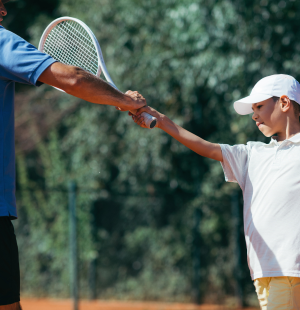
Let The Coach Coach
💬 Being a Supportive Parent—Not a Second Coach
As a tennis parent, your involvement is one of your child’s greatest assets. Your encouragement, presence, and belief in them create the foundation for confidence and long-term growth. But in your desire to help, it’s easy to slip into the role of “second coach”—giving technical advice, questioning the training plan, or even telling the coach what your child needs to work on based on what other kids are doing.
This often comes from a place of love, but can quickly backfire.
At FOFTA, we often see this: a well-meaning parent observes another child hitting bigger forehands, serving with more spin, or playing in more tournaments and starts to worry. That concern evolves into comparison, and comparison ultimately becomes pressure. The parent might suggest to the coach, “She needs to work on topspin like that other girl,” or “He’s not practicing serves enough—others his age are already winning matches.”
But every child develops at their own pace. What works for one player may not be right for another, especially when considering factors such as age, available time for training and practice, physical growth, personality, and goals. That’s why one of the most valuable things a parent can do is trust the process, coach, and focus on their child’s progress, not someone else’s path.
Letting the coach coach doesn’t mean stepping away—it means stepping into your role as a calm, supportive, and grounded presence. This role nurtures confidence, encourages resilience, and allows your child to grow without comparison, confusion, or pressure.

🧭 Why It’s Important to Let the Coach Lead
Tennis is a complex, layered sport that takes years to master. A good coach doesn’t just teach strokes—they build technical foundations, introduce strategy in phases, shape mental habits, and create long-term development plans.
When parents step in with contradictory advice or constant feedback, it can:
- Confuse the player (“Do I listen to Mom or Coach?”)
- Undermine the coach’s authority (“My parent always corrects me anyway.”)
- Add pressure and noise instead of clarity and confidence
- Lead to inconsistency in habits or mindset
Remember: Your child’s coach sees the full development arc, not just the highs and lows of one match or practice.
🧠 What Your Child Actually Needs From You
Most players, especially younger ones, benefit most when parents:
- Cheer for effort, not only technique
- Celebrate learning moments, not perfection
- Trust the coach’s timing, even if progress feels slow
- Stay consistent in message: “We’re here to support—not instruct.”
Letting the coach coach doesn’t mean being passive. It means showing trust, creating emotional safety, and letting your child enjoy the process without feeling constantly evaluated.
🔄 What Happens When Roles Are Clear
When parents support and coaches coach:
- The player receives consistent feedback
- Communication between the parent, player, and coach stays respectful and productive
- The training environment becomes focused, fun, and free from performance anxiety
- Progress tends to accelerate because the player feels less conflicted and more empowered
At FOFTA, we want to build a partnership with parents, not a tug-of-war. We welcome your questions, feedback, and involvement, but we also invite you to trust your chosen coaching system.
✅ How You Can Support Without Overstepping
- Observe quietly at practice without offering instructions
- Avoid correcting form or strategy in the car or at home
- Ask questions like “What did Coach focus on today?” instead of giving advice
- Check in with the coach if you have concerns—in private, not in front of your child
- Encourage your child to speak up for themselves during training, learning to advocate and reflect
Letting the coach coach doesn’t make you less involved—it makes you more impactful. Because when you step back from instruction, you step into your true role: the trusted supporter who gives your child the confidence to grow, stumble, and rise again.
“Your child only needs one coach—but they need you as their biggest believer.”
